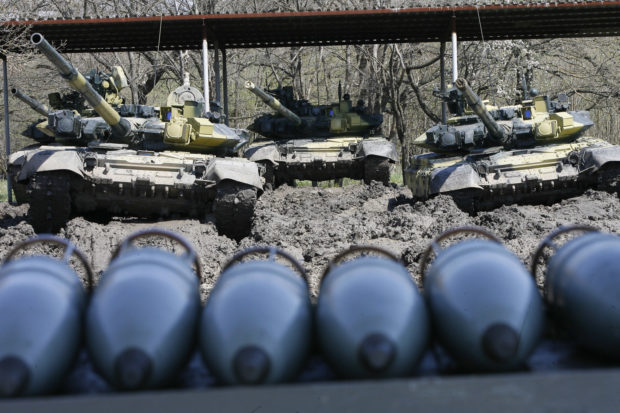
Russian T-90A tanks take part in a military drill at a training ground outside the southern Russian city of Krasnodar on April 14, 2015. Ukrainian President Petro Poroshenko said Russia had been massing troops and weapons along its borders. AFP
KIEV, Ukraine — Russia is building up its land forces and weapons along the border, Ukraine’s president said Saturday as German Chancellor Angela Merkel warned Russia not to block Ukrainian ports in the Sea of Azov.
Tensions between Russia and Ukraine were still escalating a week after a naval clash in the Black Sea on Nov. 25 in which Russia fired on three Ukrainian naval ships then seized them and their 24 crew members.
Across the world in Argentina, foreign leaders grilled Russian President Vladimir Putin about Russia’s actions, but he remained firm, squarely blaming Ukraine for the confrontation, saying its vessels violated Russian territorial waters. He didn’t address Ukraine’s accusations of a Russian military buildup.
Speaking at a Ukrainian military event, President Petro Poroshenko said Russia has deployed “more than 80,000 troops, 1,400 artillery and multiple rocket launch systems, 900 tanks, 2,300 armored combat vehicles, 500 aircraft and 300 helicopters” along their common border.
These numbers, which have not been verified, would account for the vast majority of men and hardware assigned to Russia’s Western Military District.
The naval clash came as the Ukrainian ships sailed to the Kerch Strait, the only waterway leading into the Sea of Azov and the site of a new key Russian bridge linking occupied Crimea with the Russian mainland.
Russia accused the Ukrainian vessels of violating Russian territorial waters, a charge Ukraine has denied. Ukrainian officials say Russia has now imposed a de facto blockade on its two main ports in the Sea of Azov by allowing only ships destined for Russian ports through the strait.
Merkel criticized that Russian move, speaking to reporters Saturday on the sidelines of the Group of 20 summit in Buenos Aires after holding a bilateral meeting with Russian President Vladimir Putin.
“Free shipping into the Sea of Azov to the Ukrainian coast and harbors must be ensured” by Russia, she said.
Putin, also speaking in Buenos Aires, said he told foreign leaders “how the situation unfolded” and then accused Ukraine’s government of stoking the conflict “to cover up one’s failures in economic and social policy.”
A 2003 Russia-Ukraine agreement designates the Sea of Azov and the Kerch Strait as shared internal waters. But following Russia’s 2014 annexation of Crimea, Moscow has asserted greater control over the passage.
“The Kremlin is further testing the strength of the global order,” Poroshenko said Saturday, alleging that Moscow is waiting to see whether the international community will allow Russia to assert that the Sea of Azov and Black Sea are Russian territorial waters.
Poroshenko said Russia is also increasing its presence at sea.
“In the waters of the Black Sea, Sea of Azov, and Aegean Sea, more than 80 ships and 8 submarines are on patrol — including 23 combat vessels and 6 submarines,” he declared.
In response to the seizure of the ships, Poroshenko convinced the Ukrainian parliament to implement martial law in ten border regions. Many in Ukraine and abroad have criticized the martial law order, noting that playing up the Russian threat is politically beneficial to Poroshenko, who faces re-election in March.
The martial law order included a ban on entry to Ukraine of all Russian males aged 16 to 60, a move Poroshenko said is designed to prevent undercover Russian military units from infiltrating the country.
Poroshenko said this tactic was used after Russia seized Crimea and began to support separatist rebels in eastern Ukraine, sparking a conflict that has left more than 10,000 people dead. An unsteady cease-fire has been in place there since 2015.
The Ukrainian border service said Saturday that around 100 Russian citizens had been denied entry since the border restrictions went into effect Friday.
“The vast majority of (them) could not confirm they purpose of their trip to Ukraine,” Ukrainian border guard spokesman Andrei Demchenko told Ukrainian television on Saturday. /cbb